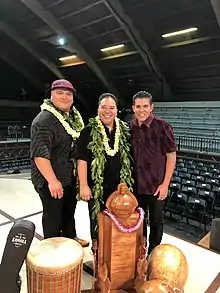Music of Polynesia
The music of Polynesia is a diverse set of musical traditions from islands within a large area of the central and southern Pacific Ocean, approximately a triangle with New Zealand, Hawaii and Easter Island forming its corners.[1] Traditional Polynesian music is largely an inseparable part of a broader performance art form, incorporating dance and recital of oral traditions; most literature considers Polynesian music and dance together.[2] Polynesian music expanded with colonial European contact and incorporated instruments and styles introduced through a process of acculturation that continues to the present day. Although the European tradition of hymn-singing brought by Christian missionaries was probably the most important influence,[3] others are evident; Hawaii's influential kī hōʻalu (“slack key”) music incorporated the Spanish guitar introduced in the late 19th century, and later introduced the steel guitar to country music.[4] Hip hop and R&B influences have created a contemporary Urban Pasifika music genre with a strong Polynesian identity and supported by the annual Pacific Music Awards in New Zealand.[5]
Christian music
In the 1790s, Christian missionaries arrived in Polynesia for the first time. Hymns and other forms of Christian music were instituted, and native musical genres were driven underground and prohibited. Soon, traditional polyphonic singing was merged with Christian styles and church singing, and along with brass bands became an important part of Polynesian music culture across the Pacific.
Popular music

Popular music in Polynesia is a mixture of more traditional music made with indigenous instruments such as the nose flute in Tonga, and the distinctive wooden drums of the Rarotonga, and local artists creating music with contemporary instruments and rhythms, and also a blend of both. In the 1980s, Fijian stars like Laisa Vulakoro and Lagani Rabukawaqa became popular across the Pacific.
Raiatea Helm is an internationally touring Hawaiian singer who has won two Grammy's.[6] Kalani Pe'a is a popular Hawaiian singer songwriter who has also won two Grammy's. His music is traditional style Hawaiian songs include four part harmonies oli aloha (greeting chants of appreciation) as well as contemporary Hawaiian music. He also translates popular songs into Hawaiian language.[7] Na Hoku Hanohano Awards are music awards in Hawaii.
There is a form of reggae called Pacific Reggae which features different instruments such as the ukulele and Pacific Island drums than reggae in other places.[8] Herbs is a popular New Zealand band in this genre. J Boog (USA) is a reggae performer of Samoan descent based in Hawaii, he was also in the boy band B2K.[8] Chris Boomer is a reggae artists from Guam.[9]
Polynesian heritage artists feature in pop music culture including Dinah Jane (USA) of Fifth Harmony.
Some Polynesian islands have developed a cassette industry, most notably Fiji, Tonga and Samoa.
Steel guitar
Popular Hawaiian inspired musicians include steel guitarists Bill Sevesi and Bill Wolfgramm who led popular dance bands during the 1950s.[10]
See also
References
- McLean 1999, p. 3.
- Kaeppler, Adrienne. "Oceanic music and dance". Encyclopædia Britannica. Retrieved 14 September 2020.
- McLean 1999, p. 431.
- Ross, Michael (February 17, 2015). "Pedal to the Metal: A Short History of the Pedal Steel Guitar". Premier Guitar Magazine. Retrieved September 1, 2017.
- "Pacific Music Awards Announced". Scoop (Press release). Pacific Music Awards. 23 November 2004. Retrieved 14 September 2020.
- "Raiatea Helm – The Official Website of Raiatea Helm | Hawaiian Female Vocalist". Hawaiian Female Vocalist - Raiatea Helm - Hawaii Japan South Korea. Retrieved 2021-01-18.
- "2018 National Artist Fellow and Grammy Winner Kalani Pe'a tours the West Coast". Native Arts and Cultures Foundation. 2018-03-17. Retrieved 2021-01-18.
- "Reggae Superstar J Boog to Play in Small Town New Zealand | Scoop News". Scoop. 2011-01-30. Retrieved 2021-01-18.
- "Biography: Chris Boomer". Reggaeville. Retrieved 2021-01-18.
- "The history of recording in New Zealand". National Library of New Zealand. Archived from the original on 25 May 2010. Retrieved 20 July 2010.
Bibliography
- McLean, Mervyn (1999). Weavers of song: Polynesian music and dance. Auckland University Press. ISBN 186940212X.
- Linkels, Ad. "The Real Music of Paradise". 2000. In Broughton, Simon and Ellingham, Mark with McConnachie, James and Duane, Orla (Ed.), World Music, Vol. 2: Latin & North America, Caribbean, India, Asia and Pacific, pp 218–227. Rough Guides Ltd, Penguin Books. ISBN 1-85828-636-0
- Hebert, D. G. (2008). Music Transmission in an Auckland Tongan Community Youth Band, International Journal of Community Music, 2(1).
- Hebert, D. G. (2008). Music Transculturation and Identity in a Maori Brass Band Tradition. In R. Camus & B. Habla, Eds. Alta Musica, 26, pp. 173–200. Tutzing: Schneider.